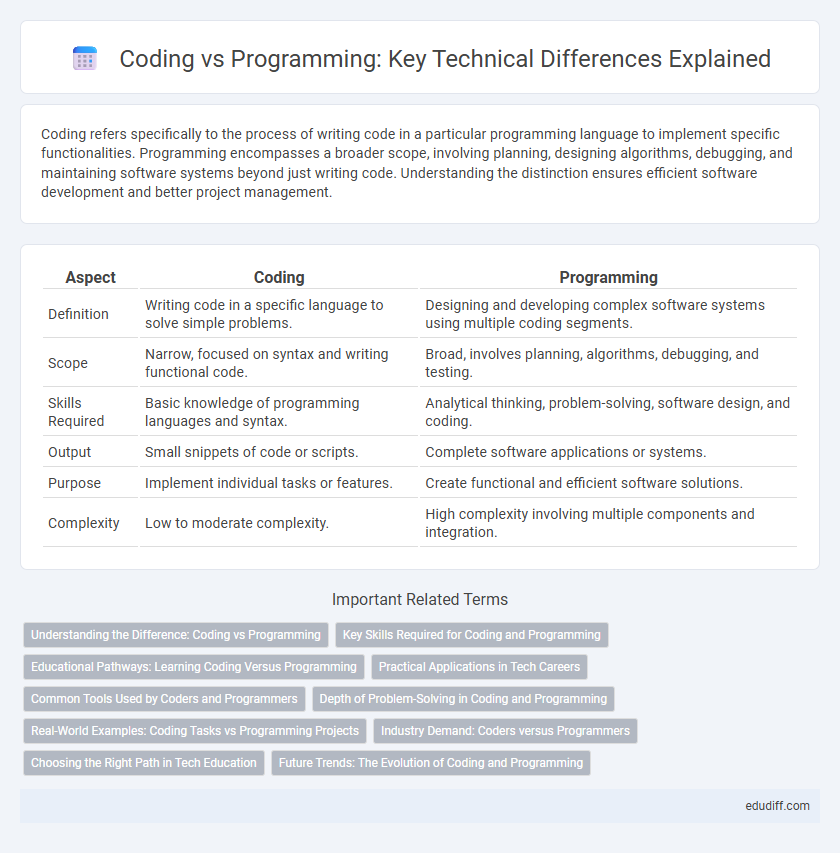Coding refers specifically to the process of writing code in a particular programming language to implement specific functionalities. Programming encompasses a broader scope, involving planning, designing algorithms, debugging, and maintaining software systems beyond just writing code. Understanding the distinction ensures efficient software development and better project management.
Table of Comparison
| Aspect | Coding | Programming |
|---|---|---|
| Definition | Writing code in a specific language to solve simple problems. | Designing and developing complex software systems using multiple coding segments. |
| Scope | Narrow, focused on syntax and writing functional code. | Broad, involves planning, algorithms, debugging, and testing. |
| Skills Required | Basic knowledge of programming languages and syntax. | Analytical thinking, problem-solving, software design, and coding. |
| Output | Small snippets of code or scripts. | Complete software applications or systems. |
| Purpose | Implement individual tasks or features. | Create functional and efficient software solutions. |
| Complexity | Low to moderate complexity. | High complexity involving multiple components and integration. |
Understanding the Difference: Coding vs Programming
Coding involves writing specific lines of code using programming languages to create software functions, while programming encompasses the entire process including planning, designing, testing, and debugging software applications. The distinction lies in coding being a subset of programming, which requires broader problem-solving skills and system architecture knowledge. Mastery of programming leads to the ability to develop complex solutions, whereas coding mainly focuses on translating logic into executable code.
Key Skills Required for Coding and Programming
Coding requires proficiency in specific programming languages like Python, Java, or C++, along with strong syntax knowledge and debugging skills. Programming demands a broader skill set including algorithm design, problem-solving abilities, software development lifecycle understanding, and familiarity with data structures. Both disciplines benefit from logical thinking and attention to detail but programming involves a more strategic approach to system design and architecture.
Educational Pathways: Learning Coding Versus Programming
Learning coding often involves mastering specific languages like Python, JavaScript, or C++, emphasizing syntax and basic problem-solving skills suitable for beginners. Programming education extends beyond coding to include algorithms, data structures, software design principles, and system architecture, providing a comprehensive foundation for developing complex software applications. Educational pathways in programming typically integrate theoretical computer science concepts with practical development experience, preparing students for advanced roles in software engineering and development.
Practical Applications in Tech Careers
Coding involves writing specific lines of code to create software functions, while programming encompasses the broader process of designing, testing, and maintaining complete software applications. In tech careers, coding skills enable developers to implement functionality efficiently, but programming expertise is crucial for problem-solving, system architecture, and project management. Mastery of both coding and programming enhances career opportunities in software development, data analysis, and systems engineering.
Common Tools Used by Coders and Programmers
Coders primarily use text editors like Sublime Text, Visual Studio Code, and Notepad++ for writing and editing code efficiently, while programmers often rely on integrated development environments (IDEs) such as Eclipse, IntelliJ IDEA, and Microsoft Visual Studio to design, debug, and manage complex software projects. Version control systems like Git and collaborative platforms like GitHub are essential tools for both coders and programmers to track changes and coordinate workflow effectively. Debuggers, build automation tools, and testing frameworks further enhance the development process by enabling error detection, compiling, and validating code quality.
Depth of Problem-Solving in Coding and Programming
Coding involves translating specific instructions into a programming language to create functional software components, emphasizing syntax accuracy and basic logic implementation. Programming demands a deeper problem-solving approach, integrating algorithm design, system architecture, and debugging to develop comprehensive, efficient, and maintainable solutions. Mastery in programming enables tackling complex challenges through abstraction, optimization, and iterative refinement beyond mere code writing.
Real-World Examples: Coding Tasks vs Programming Projects
Coding tasks often involve writing specific lines of code to fix bugs or implement small features, such as creating a function to validate user input in a web form. Programming projects encompass broader development cycles, integrating multiple coding tasks to build complete applications like a mobile app for real-time GPS navigation. Real-world examples highlight that coding centers on detailed syntax and logic, whereas programming demands architectural design, debugging, and deployment strategies.
Industry Demand: Coders versus Programmers
Industry demand increasingly favors programmers over coders due to the complex problem-solving and software development skills required in modern tech environments. Programmers are sought for their ability to design, test, and implement comprehensive software solutions, while coders typically focus on writing and debugging code snippets. Market trends show a growing need for programming expertise in areas such as AI, cloud computing, and cybersecurity, driving higher employment rates and salaries for programmers.
Choosing the Right Path in Tech Education
Coding involves writing specific lines of code to create software functions, emphasizing syntax and language proficiency, while programming encompasses a broader scope, including problem-solving, algorithm design, and software architecture. Selecting the right path in tech education depends on career goals; coding is ideal for those aiming to quickly build applications or enhance web development skills, whereas programming suits individuals targeting complex software engineering or computer science roles. Understanding these distinctions enables learners to tailor their education toward foundational skills or in-depth computational thinking, optimizing their trajectory in the technology sector.
Future Trends: The Evolution of Coding and Programming
Emerging technologies such as artificial intelligence, machine learning, and quantum computing are reshaping the landscape of coding and programming, enabling more autonomous and adaptive software development processes. Low-code and no-code platforms are democratizing programming, allowing non-experts to create applications, thereby accelerating digital transformation across industries. The integration of natural language processing and AI-driven code generation tools is streamlining development workflows, reducing errors, and enabling faster iteration cycles in software projects.
Coding vs Programming Infographic

 edudiff.com
edudiff.com